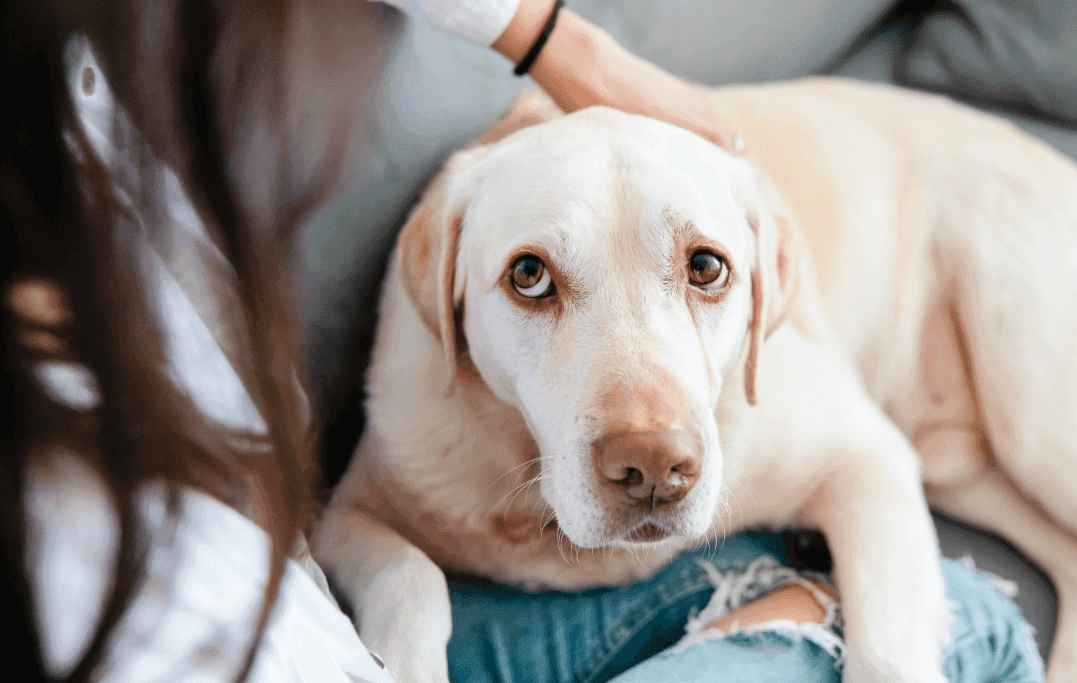
What should I do if my dog is vomiting?

There can be many different reasons why a dog is vomiting and it can be a worrying time if it’s not something they have experienced before. While the majority of vomiting cases will subside within 24 hours, continuous vomiting in a dog or if there is blood in their vomit can be a sign of something more worrying and may require urgent attention from a veterinary surgeon.
How do I know if my dog is feeling sick?
Unlike humans, dogs are unable to explain how they are feeling. Symptoms of sickness in dogs is subtle, meaning it’s important to be aware of the signs. The sooner you notice that your dog may be experiencing sickness, the quicker you can help them feel better again. A key sign to be aware of is your dog wrenching or heaving from the stomach, but not being physically sick. Dogs perform this motion to help relieve the sick feeling. If your dog shows this behaviour, we recommend seeking professional help to diagnose the issue.
Symptoms of your dog feeling sick:
Eating less of or refusing food
Swallowing/licking excessively
Drooling
Vomiting
Attempting to eat grass (to make themselves sick)
Why is my dog vomiting?
There are several lower-risk causes why your dog is vomiting, with one of the most common causes for a dog to vomit being an upset stomach.
Eating food too quickly
If a dog gulps their food down too quickly they can digest air at the same which can cause their stomach to expand, resulting in vomiting.Exercising straight after eating food
Not providing adequate time for food to digest and settle can cause indigestion and discomfort in dogs, just like it can in humans.Your dog has motion sickness
Motion sickness isn’t uncommon in dogs and can occur when travelling in a vehicle often or for a period of time.
Conditions which cause vomiting in dogs include:
Food allergies
Viral infections (parvovirus, canine distemper virus)
A sudden change to their diet, such as new food
Eating food that doesn’t agree with them, such as treats or human food that is toxic to your pet’s health
Inflammation of the stomach (gastroenteritis and can be linked to stomach ulcers)
Inflammation of the stomach (gastroenteritis and can be linked to stomach ulcers)
Vomiting in dogs can also be due to something more serious or a critical medical condition such as the following:
Kidney failure
Ingestion of a toxic substance, like plants and flowers for example, or a foreign object
Addison’s disease
Pyometra
Parasites including Lyme disease
Bladder/intestinal obstruction
Neoplasia
Inflammatory bowel disease
How to care for your dog if they’ve been sick
If your dog has been sick once and is otherwise well in themselves, follow the steps below to care for them while monitoring their behaviour closely for any sudden changes. If their condition worsens or if they’re vomiting blood, call your vet immediately.
Withhold food
Between 12-24 hours, withhold your dog’s food and begin re-introducing their usual diet gradually over a period of 24-48 hours if they have shown no further signs of vomiting.Provide smaller, simple meals
Serving a bland diet of small portions of boiled rice and chicken is recommended for dogs after vomiting as anything too rich or fatty may aggravate their symptoms.Provide plenty of fresh water
It’s important that after your dog has vomited to help them avoid becoming dehydrated by providing clean, fresh water. If your dog begins to drink more or less water, this could be a cause for concern and you should consult a vet as soon as possible.Allow them to rest
Don’t force your dog to play or walk if they don’t seem interested. Their body will need to naturally recover after vomiting, which is generally over a period of 1-2 days.
What to do if your dog is vomiting bile
If your dog is vomiting bile, this is a fairly common occurrence which can happen when the dog’s stomach is empty. Foam like and yellow in colour, some dogs will vomit bile often and is no cause for concern.
Should I contact a vet if my dog has vomited?
If your dog is vomiting chronically and/or they are showing any of the below symptoms, consult your local veterinary surgery as soon as possible for advice.
A bloated tummy
Changes in bowel movements i.e. diarrhoea
The dog is in pain
Blood in vomit or stools
Disorientation or collapsing
Diagnosis and treatment of vomiting in dogs
When you take your dog to the vet, they will ask questions to understand the history of your dog’s symptoms. This will include; how long has your dog been vomiting for, have they shown any other symptoms, for example, has your dog vomited blood, bile, or shown any signs of foaming at the mouth and has there been any recent changes to their diet? Once you have answered these questions, the vet will give your dog a full clinical examination and discuss the possible causes for their vomiting. The vet may also decide to take a urine sample for testing and/or examine your dog’s faeces for any foreign bodies. For more definitive answers, blood work and X-rays can be performed.
More serious medical and life-threatening conditions may require a dog to be hospitalised and connected to intravenous fluids to help with dehydration. As always, it’s important if you are concerned about any changes in your dog’s condition or behaviour, consult your veterinarian for advice. Consultations with Animal Trust will always be free for everyone – find your nearest local surgery.
* This advice is for UK pets only and is not a replacement for seeing a vet

